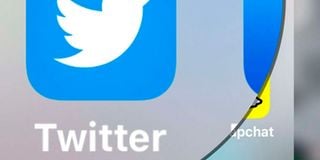What Musk’s removal of Twitter blue ticks portends

This file photo taken on March 23, 2022, shows the logo of the US social media and networking application Twitter displayed on a tablet in Lille, northern France.
What you need to know:
- You have every reason to be worried if you have been relying on your verified Twitter account to do business and put on an air of influence.
- This is because the verification tick that has for long been the sign of being a “bigwig” on the platform is set to be withdrawn.
- On Friday evening, Twitter owner Elon Musk tweeted – and this was the second time this month – that the blue ticks will soon be done away with, claiming they had been awarded opaquely.
You have every reason to be worried if you have been relying on your verified Twitter account to do business and put on an air of influence.
This is because the verification tick that has for long been the sign of being a “bigwig” on the platform is set to be withdrawn.
On Friday evening, Twitter owner Elon Musk tweeted – and this was the second time this month – that the blue ticks will soon be done away with, claiming they had been awarded opaquely.
“Legacy blue checks (ticks) will be removed soon. Those are the ones that are truly corrupt,” he posted while responding to a Twitter user’s complaint about the new blue ticks system.
This was a follow-up to his February 3 tweet: “Twitter’s legacy blue verified is unfortunately deeply corrupted. So, (it) will sunset in a few months.”
If the verification ticks are removed, a number of top tweeps in Kenya may find themselves looking “ordinary” without it.
Impersonators
Bevalyne Kwamboka is a young woman who rose to fame in 2020 after tweeting a photo of her selling chips by the roadside, which went viral. She later got her account verified. According to her, the removal of the tick will see a rise in impersonators.
“I applied for the blue tick because I was being impersonated and the people who were impersonating me were spreading so many stories about me. There was even someone who was trying to sell herself, sort of a sex worker. The verification really helped me and helped my fans and followers to tell between the real me and impersonators,” she told the Sunday Nation yesterday.
Among the most followed Twitter accounts belonging to individuals include those of politicians and opinion shapers.
Some of the Kenyans with verified Twitter accounts include President William Ruto who has 5.7 million followers, Raila Odinga (4.1 million), Larry Madowo (2.4 million), Robert Alai (1.8 million), Kalonzo Musyoka (1.4 million) and Musalia Mudavadi (1 million).
Mr Musk has not yet explained the criteria that will be used to remove the verified accounts or if it will be a blanket removal. With him having tweeted most key decisions before rolling them out, it is now a matter of when the purge will happen.
Since acquiring Twitter in October 2022, Mr Musk, who is the richest person in the world as per Forbes rankings, has been making drastic changes aimed at achieving what he calls neutrality and also monetising the platform.
In December, the firm rolled out Twitter Blue, a service that allows anyone to have the blue tick provided they pay a monthly fee to Twitter. This is the form of verification that Mr Musk favours.
Ms Kwamboka said this policy change will make Twitter confusing. “Personally, the change is going to affect me with the brands I’m working with. I mostly do marketing with my account. When you are marketing with that tick, it has more advantages than when you don’t have it,” added Ms Kwamboka.
She went on: “We just hope that he (Mr Musk) stops giving the ticks that people pay for. Impersonation will rise, and there is a lot that is going to happen.”





